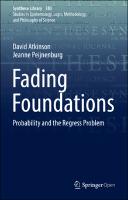Fading Foundations
Probability and the Regress Problem
| dc.contributor.author | Atkinson, David | |
| dc.contributor.author | Peijnenburg, Jeanne | |
| dc.date.accessioned | 2020-09-21T13:41:02Z | |
| dc.date.available | 2020-09-21T13:41:02Z | |
| dc.date.issued | 2017 | |
| dc.identifier | ONIX_20200921_9783319582955_85 | |
| dc.identifier | OCN: 994135021 | |
| dc.identifier.uri | https://library.oapen.org/handle/20.500.12657/41728 | |
| dc.description.abstract | This book is open access under a CC BY 4.0 license. This book addresses the age-old problem of infinite regresses in epistemology. How can we ever come to know something if knowing requires having good reasons, and reasons can only be good if they are backed by good reasons in turn? The problem has puzzled philosophers ever since antiquity, giving rise to what is often called Agrippa's Trilemma. The current volume approaches the old problem in a provocative and thoroughly contemporary way. Taking seriously the idea that good reasons are typically probabilistic in character, it develops and defends a new solution that challenges venerable philosophical intuitions and explains why they were mistakenly held. Key to the new solution is the phenomenon of fading foundations, according to which distant reasons are less important than those that are nearby. The phenomenon takes the sting out of Agrippa's Trilemma; moreover, since the theory that describes it is general and abstract, it is readily applicable outside epistemology, notably to debates on infinite regresses in metaphysics. The book is a potential game-changer and a must for any advanced student or researcher in the field. | |
| dc.language | English | |
| dc.relation.ispartofseries | Synthese Library | |
| dc.subject.classification | thema EDItEUR::Q Philosophy and Religion::QD Philosophy::QDT Topics in philosophy::QDTK Philosophy: epistemology and theory of knowledge | en_US |
| dc.subject.classification | thema EDItEUR::P Mathematics and Science::PB Mathematics::PBC Mathematical foundations | en_US |
| dc.subject.classification | thema EDItEUR::P Mathematics and Science::PB Mathematics::PBT Probability and statistics | en_US |
| dc.subject.classification | thema EDItEUR::P Mathematics and Science::PD Science: general issues::PDX History of science | en_US |
| dc.subject.classification | thema EDItEUR::K Economics, Finance, Business and Management::KJ Business and Management::KJT Operational research | en_US |
| dc.subject.other | Epistemology | |
| dc.subject.other | Mathematical Logic and Foundations | |
| dc.subject.other | Statistical Theory and Methods | |
| dc.subject.other | History and Philosophical Foundations of Physics | |
| dc.subject.other | Operations Research/Decision Theory | |
| dc.subject.other | Philosophical Foundations of Physics and Astronomy | |
| dc.subject.other | Operations Research and Decision Theory | |
| dc.subject.other | Epistemic Justification | |
| dc.subject.other | Infinite Regress | |
| dc.subject.other | Regresses in Epistemology | |
| dc.subject.other | Regresses in Ethics | |
| dc.subject.other | Regresses in Metaphysics | |
| dc.subject.other | Regresses in Philosophy of Mind | |
| dc.subject.other | Open Access | |
| dc.subject.other | Philosophy: epistemology & theory of knowledge | |
| dc.subject.other | Mathematical foundations | |
| dc.subject.other | Mathematical logic | |
| dc.subject.other | Probability & statistics | |
| dc.subject.other | History of science | |
| dc.subject.other | Operational research | |
| dc.subject.other | Management decision making | |
| dc.title | Fading Foundations | |
| dc.title.alternative | Probability and the Regress Problem | |
| dc.type | book | |
| oapen.identifier.doi | 10.1007/978-3-319-58295-5 | |
| oapen.relation.isPublishedBy | 6c6992af-b843-4f46-859c-f6e9998e40d5 | |
| oapen.imprint | Springer | |
| oapen.series.number | 383 | |
| oapen.pages | 238 |

